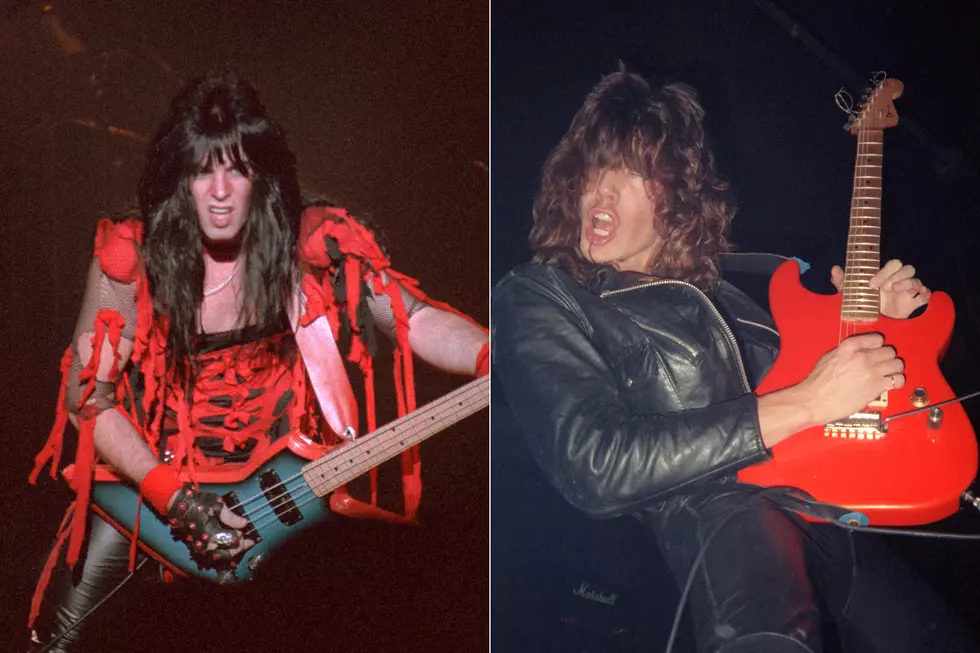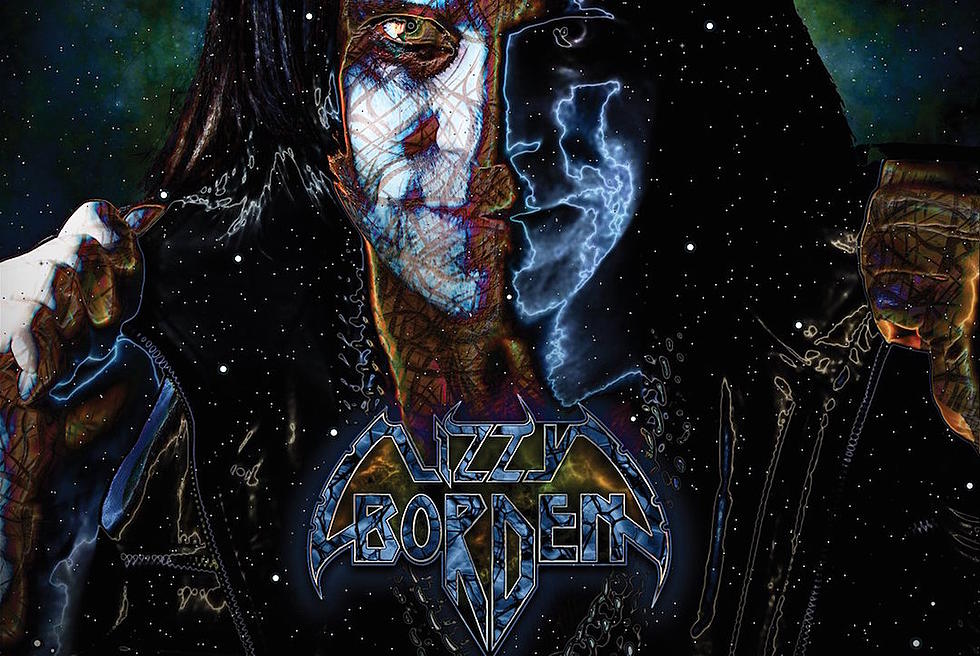
Rediscovered Steel – ‘Master of Disguise’ From Lizzy Borden
 1989 should have been a colossal year for Lizzy Borden. The L.A. band's last album, 1987's 'Visual Lies' was still buzzing in the underground and its "Me Against the World" single was a fixture on MTV's Headbanger's Ball. The stage was set for the band's next release to take them to the level at which groups like Queensrÿche and Megadeth rested. But instead of recording another album filled with straight-forward metal anthems, Lizzy Borden unleashed a completely different type of animal on us.
1989 should have been a colossal year for Lizzy Borden. The L.A. band's last album, 1987's 'Visual Lies' was still buzzing in the underground and its "Me Against the World" single was a fixture on MTV's Headbanger's Ball. The stage was set for the band's next release to take them to the level at which groups like Queensrÿche and Megadeth rested. But instead of recording another album filled with straight-forward metal anthems, Lizzy Borden unleashed a completely different type of animal on us.
'Master of Disguise' offered much more than the average metalhead at the time could appreciate or really even grasp. Sure, there were songs like "Phantoms" and "Roll Over and Play Dead" that wouldn't have sounded out of place on their earlier, more metal-leaning efforts. But MOD was also filled with elaborate orchestration, horns, and even some pop-informed ballads. Those are the kinds of musical elements that might as well be kryptonite to close-minded metal fans.
But this album should have been celebrated for the rebel nature it was created in. Considering the era it was written and recorded in, it took a certain amount of brashness to include softer moments like the stellar "Waiting in the Wings" sandwiched between piercers like "Psychodrama" and "Roll Over and Play Dead." As you'll read in the interview below, Lizzy wrote the album with the spirit of 1970's album rock in mind and heart. On "Never Too Young" Lizzy channels vintage Elton John and it's not hard to hear the Queen flavorings on the title track. Even though MOD is packed to the gills with ornate arrangements and even bigger sounding production, the band manages to still squeeze out the kinds of subtle nuances that get lodged into your head after one listen.
Sadly the album floundered commercially when it was finally released in 1989. In the years since its debut, MOD has become a favorite for a lot of older metal listeners throughout Europe and in the States proving that it was probably just ahead of its time. In 2007 Metal Blade Records re-released the record in a special 25th anniversary edition answering the silent prayers of Lizzy fans in the process.
Noisecreep recently met up with Lizzy at the famous Sunset Strip haunt, The Rainbow to talk about the album, the public's response to it, and incredibly, Céline Dion.
What really stands out for me on 'Master of Disguise' is the size of its production. Not only does the record sound sonically big, there are also a lot of different guest musicians, and even a complete string orchestra. It wasn't everyday, especially during that time period that you came across an indie metal record with such a massive production. Did Brian Slagel (Metal Blade Records' founder) just have complete artistic faith in the project that he indulged you like that?
They had very little to do with it actually. The truth is Metal Blade has always just let me do what I want when I record. The only thing that Slagel did that turned out to be instrumental on 'Master of Disguise' was find the producer, Elliot Solomon. I wasn't even aware of his work when he was suggested. Elliot was the guy who made everything happen on that album in terms of all of the logistics. The budget for the album was miniscule. He was so clever with how he did things. I told him I wanted to bring in strings, a horn section, and female background singers and no one in metal was doing that at the time but he totally got it. The album should have cost 500K to make but he got it done for a fraction of that.
Which albums did you use a template for trying to explain what you were trying to do on MOD?
There were a few actually because Elliot really wasn't a hard-rock guy. Before we recorded I gave him copies of 'Quadrophenia,' 'Welcome to My Nightmare,' 'Destroyer,' and 'The Wall.'
So a lot of Bob Ezrin productions.
Yes, absolutely! Ezrin was always my favorite producer so I wanted to try and emulate one of his records. Elliot totally got it. This was his first metal record so he would go listen to the albums I gave him and he would come back with a lot of ideas for our project.
The string sections and overall orchestration is such an integral part of the album. Did you have all of those parts worked out before you entered the studio?
I had demoed all the songs and I have those to Elliot and the orchestra conductor, William Kidd who then wrote all of the charts based on the melodies I had written for the guitar parts.
Did they come out like you had pictured them in your head?
I loved them right off the bat. You have to understand, I was expecting to have all of the string stuff done on keyboards so having them done by an actual orchestra so I was thrilled.
There are some songs on MOD that could have very easily been on a mid-70's Elton John record. Specifically, the track "Never Too Young" sounds like the kind of thing that could have found a home on mainstream pop radio. When you wrote that song, did you think you had a hit on your hands?
When I was writing the album, I had a graph with all of these titles on it. My goal was to write five songs a week. I'm talking music, lyrics, and then actually record them. I wrote "Never Too Young" on piano but I before these songs, I had never even played it before. I taught myself just for this record. A keyboardist I knew helped me out over the phone and knowing the notes from playing guitar all those years came in handy.
I just think of "Never Too Young" was recorded by someone like Kelly Clarkson today, it would be a smash.
That's what happened with Dee Snider of Twisted Sister. Céline Dion recorded one of his songs ("The Magic of Christmas Day") but I don't think she knew who he was. If she had known that before hand, I don't know if she would have recorded it.
"We Got the Power" was the first single and video from the album which was gutsy considering the horns were prominently featured and it had an R&B feel to it. I remember seeing the video's debut on Headbanger's Ball and it stuck out like a sore thumb. Did Metal Blade try to persuade you to go with a heavier, more conventional metal sounding song?
They actually picked that song as the single. I usually want to go with something else. On 'Visual Lies' I wanted to go with "Outcast" but they chose "Me Against the Word" which worked out well. For MOD I wanted come out of the box with "Love is a Crime" which became the second single. But yeah, I think choosing "We Got the Power" was pretty ballsy. We were in the time of raw guitar bands like Guns N' Roses and here we were with a rock and soul song.

Before the album hit stores, were you anticipating a mixed reaction from your fans since you took so many stylistic chances on it?
Lizzy Borden: The main thing was that I felt like I made an album that was way beyond my capabilities as a musician. Sure, I had help getting all together, but it was so far from what I thought I could ever do. So I was so proud of the album that I really didn't care what people thought of it. It wasn't going to make or break my career. I was nowhere near a place where I would fall that far. I mixed it in two weeks with Terry Brown and that was the first time I got to hear all of the tracks together and I was so excited by the way it came together. MOD sounded exactly like I had wanted it to where the album before it, 'Visual Lies,' didn't. I had wanted that one to have a huge production but Max Norman (the album's producer) stripped it all down to just bass, drums, and guitars.
Were the critics kind when it came out?
What I remember was that Guns N' Roses were still the big thing and here I was releasing an album with a full orchestra on it. I just didn't get any attention from the critics. Metal Blade had just broken ties with Enigma Records and they had the great publicity people so we went out there with very little help. So the critics that did cover the album really were great about it but we did throw a lot of them off. A lot of the positive reviews came from Europe.
After MOD's release and promotion cycle was over, you and the band just disappeared for years. Did the album's disappointing reception dissolution you?
We had toured the album till the summer of 1992. We ended up leaving the label because after we did a short after MOD had been out for a few months, the label wanted us to go back in the studio to make another album. I didn't want to do that because it was a big record for us and we wanted to tour it. So we just split with Metal Blade and ended up touring on our own from our pockets. After the long tours I got home and took a year off. Then I realized it was Nirvana time so I laid low. I could have made the best Lizzy Borden album in our career but no one would have cared. People were over metal at that time so I just started doing other stuff till the end of 1997 when we started doing the band again.
Then you guys did the 'Deal with the Devil' album around that time. Did you just feel like people were ready for heavy metal again?
Yeah, but I was so disappointed with the reaction to that album because it still seemed like the metal scene was still deader than dead. After that I started doing more of my Diamond Dogs project which is always a lot of fun. That's more like Cheap Trick and that kind of fun catchy rock stuff. Also around that time I started another record that I ended up shelving. It was in an industrial vein and a complete change from the classic Lizzy sound. No one will ever hear that stuff.
The band was featured in the 1988 documentary, 'The Decline of Western Civilization II: The Metal Years' and that was probably how a lot of people found out about you. The film has become a cult classic through the years but a lot of the bands in it were shown in a negative light. How do you feel about the way you were portrayed?
I think it was positive for us and you're right, it turned a lot of people onto the band. I regret doing "Born to be Wild" though.
Yeah, I always wondered why you would go with a cover song. I would have preferred to seen you play something from your own material.
We were being managed by the same team as Steppenwolf at the time so we played it a few times for fun. Penelope Spheeris (the director) really loved it so she picked that but I was never happy about it. Another thing that disappointed me came on the night of the film's premiere. Right before it was about to start playing, Spheeris approaches me with a strange look on her face. She then tells me that most of the stuff I had done for the movie was cut out. When she first started filming, she didn't have any big names involved yet. Then when word got out about it, people like Ozzy, Alice Cooper, and Kiss jumped onboard. So in the beginning I did a lot of stuff with her but she had to make room for all of the bigger artists.
Hopefully they give the movie a big re-release on Blu-ray and all of the content you filmed gets included.
That would be amazing!
More From Noisecreep





